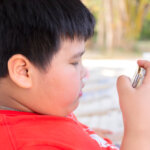






Peter Gray on NPR Today: Constant Adult Supervision is Destroying Kids’ Mental Health
This morning, the very popular New York City radio host Brian Lehrer interviewed Let Grow Co-founder Peter Gray on WNYC, New York’s NPR station. You can listen here. Lehrer is devoting this whole week to the “youth mental health emergency.” That is how this sad and scary moment is being described, as childhood anxiety, depression and self-harm shoot upward.
Gray was the first guest on this topic thanks to his piece in The Journal of Pediatrics: Decline in Independent Activity as a Cause of Decline in Children’s Mental Wellbeing. It describes how kids’ free time and free play have been declining since the 1970s, replaced by adult-supervised activities. The understandable goal was to keep kids safer and safer, by always watching, teaching, and helping them.
To which Lehrer asked a very basic question: Wouldn’t conventional wisdom suggest that keeping someone safe would make them feel LESS anxious?
Too much “safety” can backfire.
You’d think! But here’s the catch, Gray explained: Everyone has something called a “locus of control.” When you have a well-developed INTERNAL locus of control, you feel you can handle things, solve problems, make your own decisions. You are in control of your life.
An EXTERNAL locus of control is when you feel people or forces outside of you are in charge. Someone else is directing you. You don’t have the ability — or even the opportunity — to deal with the problems and possibilities of everyday life. “And people who lack that ability, regardless of age, are far more susceptible to anxiety and depression,” said Gray.
“My childhood freedom made me sane.”
The callers immediately understood this point. One recalled his “stay out till the streetlights come on” childhood. He rued that his own kids and their friends had some “issues” that he thought could be related to the fact they’d so much less chance to run around, take some risks, and do things on their own. “They’re hung up on things…very anxious,” the caller said.
Another caller wondered whether she was being overprotective with her own child. To which Gray replied, “Overprotective parenting has become the norm and it’s very difficult to do something counter to the norm.” He added that Let Grow is changing the laws to make sure reasonable childhood independence is not mistaken for neglect in these anxious, judge-y times.
The final caller, a high school teacher whose students are high achievers, said she has found their maturity levels a lot lower in the past few years than when she began teaching 15 years ago — and COVID made everything worse.
What about social media?
To Lehrer’s query about social media being the real problem, Gray pointed out study after study has found that kids online would RATHER be hanging out together in real life. But when that’s impossible — or when there’s always an adult supervising — online becomes the only place to gather.
“Are they avoiding meeting friends in reality because of social media, or are they using social media because we are not allowing them to meet up in reality?” is how Gray put it.
That question seemed to blow Lehrer away. Expect more discussion of this!
How to give kids an internal locus of control:
And if you’d like to create more independence in the lives of the kids you love, teach, or work with, consider doing The Let Grow Project: Kids get the homework assignment, “Go home and do something new, on your own.”
Want a place where kids CAN gather, and NOT be on their phones? Consider starting a Let Grow Play Club in your school or neighborhood. Schools (or backyards, or parks) stay open for mixed-age, NO PHONE fun, as old-fashioned as it gets. An adult is there, but as a lifeguard, just for emergencies.
By overseeing so much of kids’ lives we accidentally sucked out the independence, competence, autonomy and fun. It’s not hard to give all that back, once we realize that truly making kids SAFE means protecting their internal locus of control.



Considerable research also suggests parents who pursue next to no fun beyond their kids may often suffer similar emotional problems. Besides how oppressive, depriving helicoptering can be for kids, what kind of life can it leave for parents? How can they be persons themselves with proper boundaries, freedoms, lives that inspire their kids, others, themselves? I aspired to be independent, responsible, to socialize, to learn . . . , largely because my parents did.